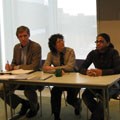|
A panel discussion presented at the 2008 Boston Harbor Islands Science Symposium, in cooperation with the Massachusetts Marine Education Association.

Panelists: Kelly Fellner, Youth & Visitor Services Program Manager, Boston Harbor Islands, National Park Service Irving Medrano, Peer Leader, Boston Harbor Island Ambassadors
Arthur began the discussion with some background information on the importance of our relationship to nature as children and related research and legislation. Kelly then asked Symposium participants to share their formative experiences with nature and their thoughts about how to connect young people with nature today.
The “Island Ambassadors” video featuring Ling Lin, Irving Medrano, Rebecca Montgomery, Stephony Reeves, and Lili, and the “Get 'em Outside” video (from www.nclicoalition.org — distributed on YouTube) were screened as part of the panel. Background
Formative Experiences Carl Johnson: I'm a retired school teacher after 39 years who won a Mass Audubon award. We need to get the head masters to the islands. On a trip where I led a middle school classroom and their teachers out to an islands I saw first hand how teachers will become more inspired and encouraged when they see how excited their students are when their learning from the outdoors. Teachers don't want to give up time in the class room because that's time they need to study for MCATS and they have to meet MCAT requirements. But studying for MCATS does not involve experiential learning. Bruce: (Recounts his early experiences outdoors, mainly that it was a place to play.) Ranger Beth (DCR): I had many experiences through AmeriCorps. People carry these types of experiences with them into their future careers. Irving: The islands help me find myself again. I go out there to get of the city and collect myself. I've had role models like Kristen Wyman, Ranger Dawn and Kelly Fellner. I've been given many opportunities as an Island Ambassador and because of the islands that I would not have had otherwise. Roger Achibald: Sailing seems like a natural way to get teachers and youth out to the islands. You could get time donated from yacht clubs maybe. Then of course there's the question of liability. Adam Clark: (Asks if there are studies about the chances of getting hurt outdoors and what methods might be used to overcome the general impression that it’s dangerous to be outside.) Kelly: Maybe we’re just so disconnected. We need to be outside more to maintain a level of comfort when we're outdoors. Youth and adults alike don't know how close to they are to the islands. Jess Rykken: Two Island Ambassadors have also come to work in the lab. Audience member: [addressed to Irving] How did your parents feel about you going to the islands? Irving [in response to audience question]: My parents encouraged me to go (to the islands) which helped me feel good about going...Without the ambassadors program I would not have thought to go or know about it. My friend convinced me to join the ambassadors program. It wasn’t an issue about being allowed to go, but I didn’t have the opportunity otherwise. Arthur: And so we can see that yes the islands offer academic value but as we saw in the Island Ambassador's video they offer spiritual renewal and a natural way of learning. Throughout the videos, teens made similar comments, showing the universality of feelings that come from being outside: “forget worries,” “feel connected,” “be ourselves,” “forget stress.” Most of the teens commented on their “double-life” in the city and on the islands. A consistent theme of spiritual renewal was evident. |
Last updated: February 26, 2015
